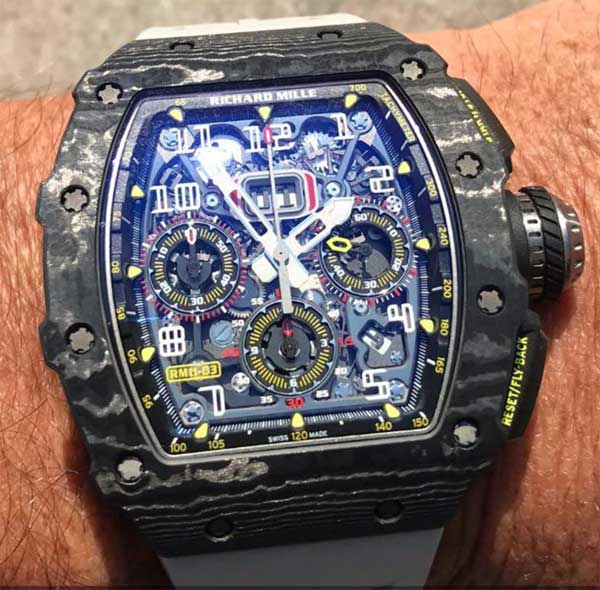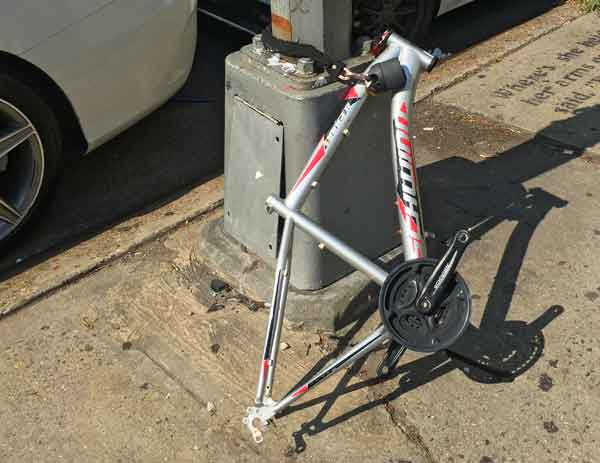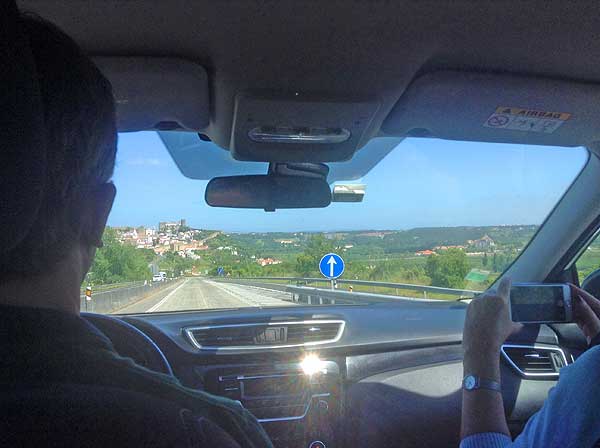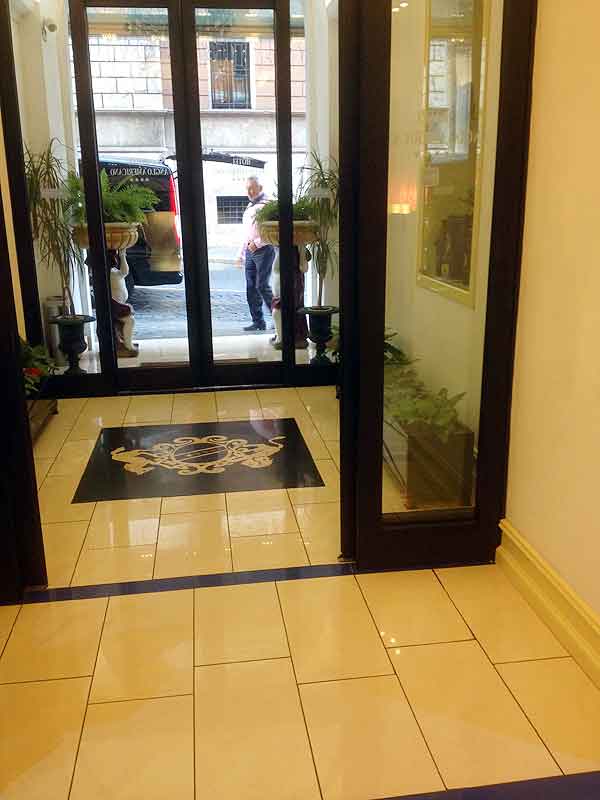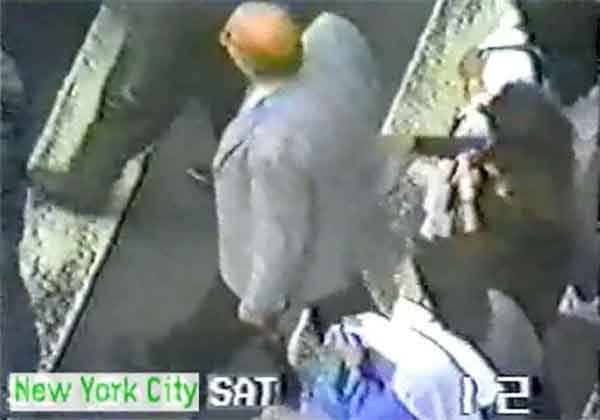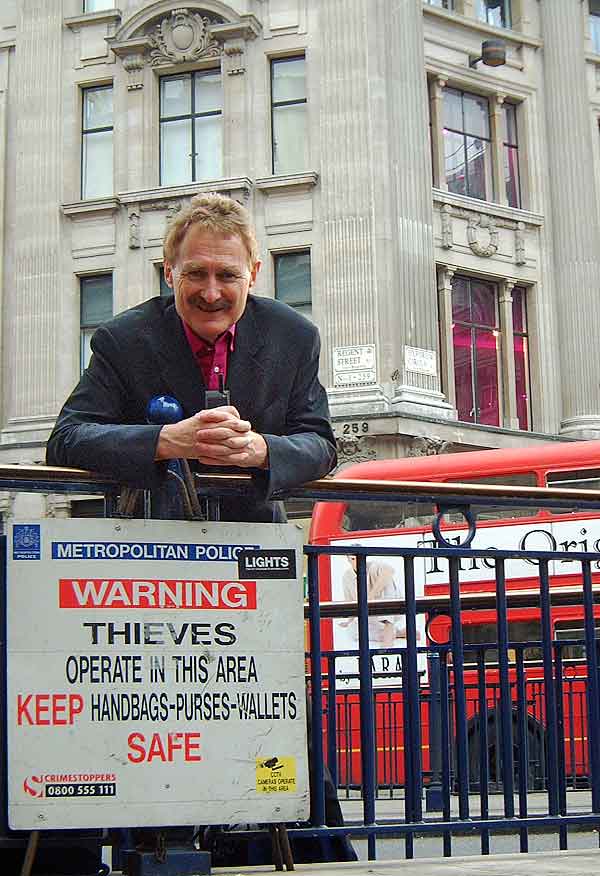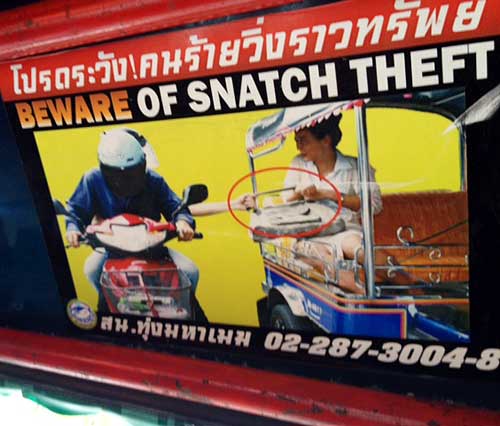Watch-theft in Stockholm is drastically increasing. Most seem to be targeted and well-planned. Social media may be a research tool for the thieves.
Continue readingLocked bike stripped by thieves? Or…
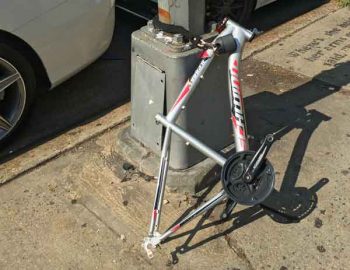
The bike owner used a massive chain and hefty lock to secure his bike to a pole. He had a delivery to make at the nearby Terrific Tenements. He was only away for half an hour or so as he located the address, dashed up a couple of flights, and got a signature for his delivery.
When he returned, the front wheel of his bike was gone. In an iffier neighborhood, he’d have popped off the front wheel and run the chain through it to prevent just this scenario. Now he was stranded.
Angry at the thief and angrier at himself for his laxness, he pulled out his iPhone and requested an Uber. Four minutes. In New York City, that could mean twelve, with traffic, double parking, out-of-order stoplights. He watched the progress of his ride on the phone.
Wham! He was suddenly viciously shoved from behind. As he stumbled forward, his phone was ripped from his hand. He fell, landing on his face, barely aware that his pockets were rifled. He never saw the thieves. He didn’t hear them, or know how many there were.

His Uber arrived a few minutes later. He dragged himself up, bloodied and bruised, and hobbled to the car.
“What happened, man?”
“Thugs,” was all he could manage, “my phone’s gone. And my front wheel.” He patted his pockets and shuddered, emerging from his shock. “Uh, also my wallet and keys.”
“Aw, brutal, man. Here, catch the blood.” The driver thrust a wad of Dunkin Donuts napkins for the injured man’s scraped face and cut hand.
“Shit, they got my bike lock key. I can’t even take my bike. Or what’s left of it.” The biker stared up at the sky for a moment and blotted his face. The driver waited patiently.
“D’you have a wrench, by any chance?”
“Sure, man, I have a tool bag in the trunk.” The driver popped open the trunk and spilled out his tool collection.
The bike rider picked out a wrench, a couple of screwdrivers, and a set of Allen wrenches. He went to work on his bike, removing first the saddle and its post, then the pedals, chain, rear wheel, handlebars with cables and accessories, the fenders, the rear rack, the kickstand, the seat post, and the brakes. He put each piece of his bike into the trunk, finally wiping his hands on the Dunkin Donuts napkins.
“Maybe I can get another key and come back for the frame,” he said, “or maybe it’s not even worth it. I think I’m done with biking in this city.” He rubbed his face, the unbloodied side, submindful of the time he sped into the opening door of a parked car, shattering the bones in his face. “I’ll sell these parts. Better than letting the thieves get it all.”
…
Or, was the bike stripped by thieves?

Maybe thieves did get it all. I saw this bike, or what was left of it, in the Hell’s Kitchen area of New York City a couple weeks ago. It wasn’t the only bicycle remains I saw still locked to poles, but it was the cleanest.
Wonder about that writing on the sidewalk? It’s a quote from Bob Dylan’s Señor (Tales Of Yankee Power). Improperly punctuated (“where’s”), but has to make you wonder what else happened on this spot.
Bag stolen in Barcelona cafe

The loss of a valuable shoulder bag stolen in Barcelona was devastating to the victim. The bag had been on the floor beside her chair in a café. The theft happened in just a moment’s lapse of attention.
My name is Rashmi Raman. I am a 32-year-old Indian woman from Delhi where I am law professor (yes, the irony of being a lawyer and getting robbed is not lost on me).
My handbag containing 2,200 euros, 800 USD and a few hundred British Pounds along with a lot of other currency souvenirs from my travels and all my bank cards and national identity cards, passports (old and current), yellow fever certificate (from my time in Africa) and my journal, a book, personal cosmetics and electronics was robbed from right next to my chair while I had a morning coffee with a colleague at No. 3, Calle Pelai in Barcelona at 10.40 AM on Friday July 22.
Bag stolen in Barcelona café
The café we were sitting inside was Subway, right across the street from our hotel. I wouldn’t normally have had all my money and papers on me for just stepping out for a coffee though I have been traveling with all this on me for years now. I don’t know how to rationalize what happened to me but I guess it’s just really really rotten luck.
I filed a police report immediately at the underground precinct at Plaça Catalunya. The next day I went back to the café to meet the owner and request to see the CCTV footage. He was kind enough to show it to me. I watched in horror as the CCTV footage clearly showed a white man, dressed in checks, calmly grab my brown leather bag, throw something white over it and walk out of the café. Ten seconds later I saw myself leaping up in panic on the video.
I don’t know how I survived it… My life has been a nightmare the past weeks since then. Getting back to India without a passport and no money was hellish. I don’t know how long it will take me to come to terms with everything I lost that day.
What inhuman madness would possess someone to steal every scrap of my worldly belongings and leave me destitute and without identity in a foreign country where I don’t speak the language? Why couldn’t he have had the courage or decency to return my passport and identity cards to the hotel? The hotel’s key card was in the bag. It is not too difficult to understand what hell you are unleashing on unsuspecting tourists by robbing them like this.
I will never see again the familiar pages and the many beloved stamps on my passports. I cannot understand what use they are to him? He probably threw away everything except the cash. He threw away the hard-earned records of my whole life.
Don’t blame the restaurant—thieves are everywhere!
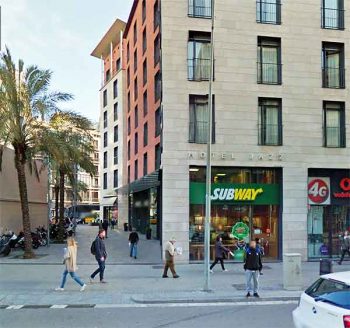
I felt really silly actually going to Subway for a coffee that morning—in a month of traveling in Spain that was the first and only morning I chose a chain restaurant over the dozens of much more charming local cafés… I can’t imagine what got into me to go to Subway that day.
I was staying at the Catalonia Ramblas which is across the street from the Subway on 3, Calle Pelai. The hotel staff were really amazing and helped me file the police report, translated for me, and were a huge support.
I’m using my real name in case the thief ever reads this and he has all my ID (as well as my personal journal). Perhaps nobody knows more about me than he does!
Thanks for the work you are doing documenting theft in Barcelona and giving victims like me a space to vent—it is much appreciated.
— Rashmi Raman
I feel for Rashmi. I, too, often carry a loaded shoulder bag when I travel. And that’s despite everyone’s advice—including my own—to leave it in the hotel room. Sometimes the room isn’t ready. Or you don’t feel great about the security in the room. Or you need that cash or those documents with you. Sometime, you just need to carry your stuff.
In those cases though, there’s one rule I never, ever break: keep physical contact with the bag. It’s big and heavy, but it stays on my lap. Or tight behind my back on the chair. Or maybe with my foot through the straps (very rare). Even that practice is not failsafe—bag snatchers may rip and run. I never, ever hang my bag on the back of a chair. My husband, Bob Arno, is a white-hat pickpocket. Watch him easily steal items from customers in a café.
For almost every bag stolen in Barcelona, and there are many, there’s a rule broken. I said almost. Read the horror story about the bag stolen in Barcelona right off a woman’s lap!
Keyless car theft, increasing crime
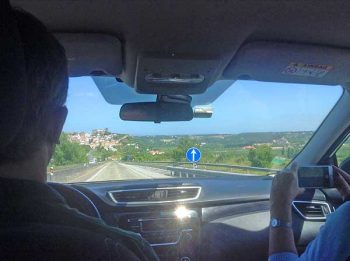
Keyless car theft is possible even when a car is locked and the electronic fob is away from the car. With a small electronic gadget, thieves can open the car and steal its contents, start the car, and drive it off.
Eve D. wrote to tell me about the recent theft she experienced while traveling by car through Portugal. Eve is well aware of theft risks, and her husband, Jeff, goes so far as to Velcro his wallet. I presume by that Eve means that Jeff keeps his wallet in a pocket with a Velcro closure.
Eve wrote:

We drove from Lisbon to the tiny walled town of Obidos, Portugal.
There, just outside the city wall, our rental car was broken into and all our carry ons, with all our valuables, were stolen. Our car was an SUV so you could see that we had luggage in the car, but the car was definitely locked when we left it.
The thieves just took the carry ons, leaving the big, more obvious suitcases. They used a remote control thing that can open cars with keyless entry.
Keyless car theft
Keyless car theft is a growing crime and a threat to all (it seems) cars with touchless wireless key fobs. Wireless-entry fobs work by proximity; the doors won’t open and the car won’t start unless the fob is quite close to the car. The signals sent between the car and fob are weak, so the two must be close to one another in order to work. At least, that’s how it’s supposed to work.
When you’re at home, where’s your car? In the driveway? On the street? And where’s your electronic key (and your spare electronic key)? In the house somewhere, right?, and too far from the car to work.
Car thieves are using an electronic signal booster, or amplifier, to make the car and distant key communicate with each other over a longer distance. When it works, the thieves can unlock the car, start it, and drive away.

In Eve’s case, it’s not clear that her key and car were close enough together, since she describes her car as being parked outside the ancient (thick) city wall. However, a thief with a signal amplifier, good timing, and a lot of nerve would be able to accomplish the boost and get the car unlocked before the fob walks too far away. That is, beyond several hundred meters. Especially if he doesn’t intend to start the car.
We were moving from one town to another and decided to stop at Obidos to have lunch. We were not parked in a secluded spot; there were probably about 15 cars in the lot with us. There were workman inside the walls setting up for a medieval fair. Some of the cars were probably the workers’ so maybe there wasn’t much in-and-out activity. I tend to think the workers could have been involved.
I would guess not. The workers are gainfully employed (in a country with 11-12% unemployment), they were busy working, and they wouldn’t likely risk their jobs.
Keyless-entry car theft
We did file a police report. Thank goodness one in our group was a Brazilian who spoke Portuguese, but I don’t think filing the police report did much good. The police said they would keep a lookout for our things along the road. Obidos is a very safe city, somewhat off the beaten track. But the police said ours was the second incident reported that day.
Sounds like a booster-booster in the neighborhood. (Do I need to point out that booster is slang for thief?)
The rental cars in Europe have stickers on their windshields announcing the fact that the car belongs to tourists. So, please remind tourists not to leave anything in their cars.
Excellent advice, when possible. But how should Eve have behaved differently? It was a calculated risk, a short stop, a quiet town, a happy mood, and everything should have been okay. You have to live, right?
I’m sure that I wouldn’t have taken that chance though. I’d choose a restaurant where I could park my car in full view from a window or patio, or I’d get something to go, or leave a volunteer to stay with the car. But I’m in the steal business and more aware of the risks. I’m not much of a chance-taker. (I lived in Vegas for 20 years and never gambled.)
I think the clicker thing, remote door opener, has been around for a while. We had our whole car taken in Marseille about 10 years ago.
Eve is right. These keyless-entry signal-amplifiers have been around for some time, though they haven’t been seen much by law enforcement. Just this week, European security researchers announced that most cars built by Volkswagen since 1995 can be broken into with a wireless hack. “Our findings affect millions of vehicles worldwide and could explain unsolved insurance cases of theft from allegedly locked vehicles,” the researchers wrote. Millions of vehicles! (Eve’s rental was a Nissan.)
Earlier this month, two men were arrested for keyless car theft, suspected of stealing more than 100 cars and moving them across the border to Mexico. Rather than a signal amplifier, these men used a laptop and software intended for use by dealers and locksmiths. It’s yet another way that keyless-entry systems can be bypassed. A safety-hatch for us car-owners, it’s also a backdoor ready to be exploited by any evil-doers so motivated.
So, why did Eve’s thieves take the carry-ons and leave the large luggage? Maybe they got away on a motorcycle or in a tiny smart car. Maybe they ran out of time. Or maybe they wanted the jewelry and electronics more likely to be found in carry-on bags, and didn’t need the socks and sweaters that would be in suitcases.
So just a reminder…the rental cars in Europe have stickers on the windshield. Do not leave anything in the car, and maybe not get an SUV. Our car was parked in a small lot so maybe not public enough. Also there was a curve in the road so that someone could be looking out. There were work trucks there too.
Try a faraday cage
What else can we do to protect our cars and their contents? You can keep your fob (and spare) in a faraday cage to prevent it from transmitting radio signals. A faraday cage could be your refrigerator or some other metal box. (A refrigerator might not be good for the key fob’s battery.) Or it could be a pouch or wallet made of metal mesh especially for this purpose—many are available.
If you park in a high-crime area or you drive a highly-desirable car (to a thief), and your keyless-entry fob is typically within 100 meters or so of the parked car, it might be a good idea, unless you can secure the car in a locked area. For the rest of us, it might be a step too far. And it certainly cancels the convenience of a wireless fob.
Of course the manufacturers should fix this vulnerability—though they’ve known about it for five or more years already and haven’t. In the meantime, we drivers will lose more cars and more personal items left inside our cars, and find little or no trace of the thieves.
EDIT 8/20/16: In a reverse problem, you might be locked out of your car when your key fob is affected by interference from a neon sign or locked out of your garage due to interference from LED lights in the garage.
EDIT 11/28/17: Watch video of two white-jump-suited thieves steal a Mercedes using a signal amplifier. Takes 19 seconds to get the car door open.
Hotel lobby baggage theft
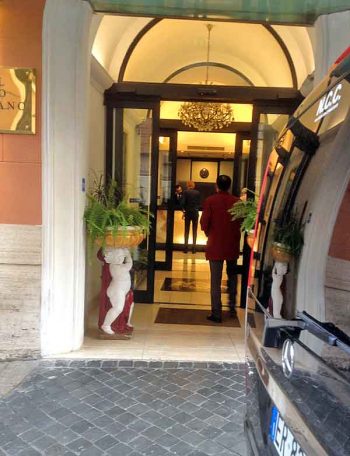
[dropcap letter=”H”]otel lobby baggage theft is common precisely because people think it is not. We tend to feel we’ve entered a safe zone when we enter our hotel lobby.
And of course, it feels that way: compared to the city on the other side of the door, it is cool (or warm, if it’s winter), quiet, and peaceful. All the hustle and bustle of the street disappears, the crowds, the traffic, honking, sirens, beggars, hawkers, weather. The lobby may have flowers, scent, soothing music, something to drink, smiles. Compared to the outdoors, the lobby is the very nirvana the hotel advertises.
Hotel lobby baggage theft
Bob and I went to Rome recently for a film shoot with a German production company. We arrived two days before the film crew, but we happened to be in the lobby when they arrived. All ten of them entered with their luggage and crowded around the reception desk. Several tossed their backpacks into a corner while they checked in and introduced themselves to Bob and me. Eyeing those unguarded bags, I decided not to be a worrywart, a killjoy, and a hysteric. I thought I’d do my best to keep my eye on the bags.
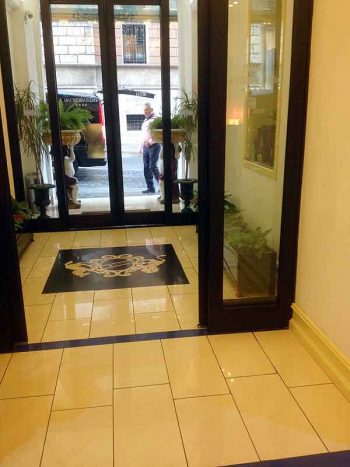
The lobby was mildly chaotic with check-ins, greetings, and the driver back and forth with luggage. Next thing I knew, one of the crew lunged toward the luggage and grabbed the hand of a crouching thief.
It happened so fast it almost didn’t happen. The thief ran out the door empty-handed. Bob and I took off after him.
Bob ran faster and further than I did, and eventually caught a man who claimed to be a friend of the thief’s. We had not gotten a good look at the thief in the lobby—not that this guy knew that. Strangely, he didn’t object to my openly filming him. He also gave us his mobile phone number. Marco, a member of the crew who’d caught up with us, called the number right away to see if the number was correct. The friend-of-the-thief’s phone rang. None of us could identify the thief, so after talking for a while, we said goodbye.
Meanwhile, a police car had parked in front of our hotel. In the back seat was a newly-arrested pickpocket and outside of the car a victim was identifying the pickpocket to a policeman. That incident was totally unrelated to our attempted baggage theft. One of our crew used the opportunity to tell the officer about our almost-theft. We didn’t speak with the handcuffed pickpocket or the victim, but we wished we could have since we’d come to Rome to shoot a special on pickpocketing. What a coincidence!
The moral of the story is that baggage can’t be safely ignored in a hotel lobby. Not even through two glass doors, not even with a crowd of pals around, not with the receptionist facing the door, not even for a minute. But this story gets weirder. Much weirder!
At midnight, a thief calls

At midnight, Marco’s phone rings. We’d had a good day of filming, a good dinner together, and we’re all standing in Piazza Barberini enjoying the night air and the energy from our successful shoot.
Marco doesn’t recognize the Italian phone number calling him but he answers his phone. His face darkens.
“I saw you and I know where you’re staying,” a man threatens in English. “I’m the guy who was in the back of the police car. In front of your hotel.”
What? None of us had ever spoken with that perp. We hadn’t given any of our phone numbers to anyone.
The thief continues: he knows who we are. We better not put any footage on Youtube. And he hangs up.
Marco is shaken. The rest of us are confused. Who was the man on the phone? He was certainly not the one who tried (and failed) to steal a crew member’s backpack in our hotel lobby. Neither was he the friend-of-the-thief. This guy was handcuffed in the back of a squad car during all that action.
Bob and I come up with a theory. A small band of marauding thieves had been prowling the area. As one attempted hotel lobby baggage theft, another pickpocketed a man on the street. A multidisciplinary criminal outfit on a self-enrichment offensive. Unspecialized opportunists on a hit-and-miss venture.
Bob phones the mystery thief. “Bob Arno, I know you,” the pickpocket says. “I’ve watched your film. I’m sitting here in a cafe with about 30 other pickpockets and we’ve all seen it.” No longer threatening; he’s positively jovial. He had heard the police officers talk about our tv shoot while he was being booked at the police station. He was let go (of course), and later reunited with his friends. The one whose phone Marco had called, and the one who had tried to steal a backpack.
Knowing Bob Arno from the National Geographic film Pickpocket King, the three paranoid thieves thought Bob had filmed the attempted baggage theft and did not want the footage put online.
Bob phoned the pickpocket once more:
The next day I call him, via Skype. We bond, and have a good conversation. And he spills some secrets: the size of their network, how they work and where, and how long they stay in one country. About thirty of them, all Moroccans, make up the gang. He is friendly and quite educated. This surprises me. This is nearly always how we start out: digging and drilling down for information. Gentle, easy question at first, slowly building some sort of rapport. Eventually we can map their entire operation, including girlfriends, snitches, fences, and on and on. Some of these efforts can take years, and they are not all successful.
All this resulting from a hotel lobby baggage theft that didn’t even happen. Read about Marianne, an actual victim of hotel lobby baggage theft.
The undetectable impostor infiltrating hotel lobbies
Think you’d notice a bag thief prowling around your hotel lobby? You haven’t met “Pedro,” a very different practitioner of hotel lobby baggage theft. Pedro, a multi-talented thief working in Paris, told us:
If you want to make money, you have to go to the big hotels, the five-stars. You use psychology, so you’re not suspected. You must be well-dressed. If you look like a good man, the person working the doors doesn’t keep you out. You are a good man! You have to feel like a good man to avoid security.
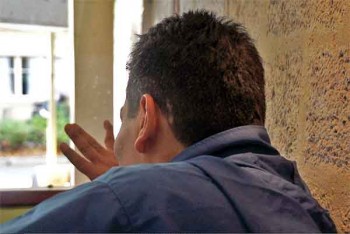
Look and feel like a good man. By that Pedro means appearing respectable, unimpeachable. Unlike our bag-thief-wannabe in Rome, Pedro doesn’t snatch and dash. He stands right beside you—orders coffee beside you in the lobby bar. He’s a good actor—you don’t suspect him. You don’t raise your antennas because he’s near. In fact, your guard is down. You’re in the hotel lobby!
Theft by Blocking
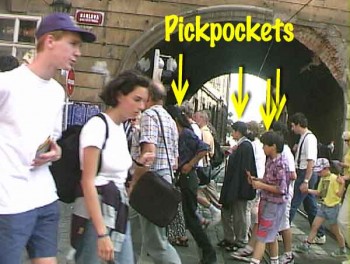
Similar to the Prague pickpocket teams I’ve written about but even more sophisticated, was a South American gang regularly devastating an intersection on Fifth Avenue in New York City. A famous jewelry store on that corner mounted an offensive which starred several high-powered video cameras. The gang was made up of Jenny—the dip, three blockers, and a stall. They worked the intersection for hours at a time with brazen confidence and utter impunity. Each time Jenny made an illicit withdrawal, she counted the money in her hand—right out in the open—and divvied it up among her cohorts while crossing the street behind their victim. That way, NYPD Detective Crawford said, if accused, no single member would be carrying too much cash. Well, they might be, considering they made up to $8,000 per day, according to Crawford.
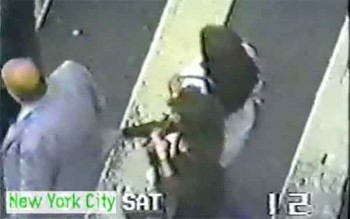
Like the Prague gang, Jenny’s danced an intricate choreography practiced until it appeared effortless. Their maneuvers impeded the victims’ forward progress, but they often performed in motion as well, tightly clustered around a victim as they crossed the street together, Jenny with her hand groping in a pocket or purse, her assistants positioned to block the views of other pedestrians. They did not, however, block the view from above, where mounted surveillance cameras tracked them like hawks tracking mice. The gang was arrested and Jenny served three years in prison.
Theft by blocking
While impeding employs a brilliant strategy that is simplicity itself, an opportunity must present itself. Therefore, I consider it an avoidable theft. None of us need be victims of impeder-thieves. We’ve seen the impedance technique (theft by blocking) used at doorways, including bank and department store doors, at turnstiles, at the entries of trains and buses, and at already-existing bottlenecks on sidewalks. Prague’s Wenceslas Square has a beauty: a subway stairway in the middle of a sidewalk, which forces pedestrians into a narrow passage. Thieves are known to prey there. Revolving doors are also frequent settings, and there, the door itself does the impeding. A purse is snagged just as a woman disappears through the doorway, leaving her valuables exposed and she, stuck.

Subcategories of theft by blocking include those who work on public transportation, which I discuss in Chapter Six [of Travel Advisory: How to Avoid Thefts, Cons, and Street Scams], and those who script their teams like 30-second plays, tight as a television commercial, which I expose in Chapter Seven. In all impedence thefts, though, three ingredients are required: a stall who hinders the victim, a dip who extracts the goods, and accessible valuables. In other words, it’s preventable.
Excerpt from Travel Advisory: How to Avoid Thefts, Cons, and Street Scams
Chapter Five: Rip-Offs: Introducing… The Opportunist
Massive smartphone theft ring busted in London
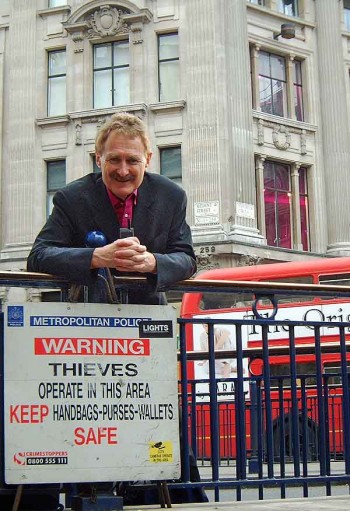
Pickpockets are free to steal as usual on London’s Tube and trains, but they’ve lost their biggest buyers of smartphones. British Transport Police nabbed 13 gangsters, including the ringleader, in a September 11 pre-dawn raid on multiple locations.
Smartphone theft ring busted
1,000 smart phones were recovered, all wiped clean of data, reset, polished up, boxed, and labeled. The phones were to be shipped to Dubai, eastern Europe, and northern Africa to be sold as new. This scheme reportedly netted the gang about 1.6 million dollars per year.
Excellent work by the British Transport Police and its “Dip Squad!”
However, the pickpockets remain at large. Public transportation passengers in and around London are no safer, and neither are their smartphones. Time to brush up on Pocketology 101 and Purseology 101 for smart-safe storage of valuables.
Actually, I suspect some of the pickpockets may briefly desert the trains and work the streets while “the tip is hot,” as they say. Uniformed and private eyes are on the lookout on the trains and platforms, and in the stations. Think thief. If I were one, I’d cool it on the trains for a week or so.
The pickpockets, doing the grunt-work for the organized crime ring, get paid like any grunt-workers, but enough for them to risk arrest, fines, and brief imprisonment.
The ringleader though, was living the high life in a million-dollar riverside apartment. He’s said to be an Afghan Sikh in his forties. His Audi Q7, parked in the basement garage, contained more than 200 smartphones.
My pet peeve: the persistence of the term “petty” when referring to theft by pickpockets. They’re taking wallets with credit cards they can exploit for thousands of dollars. They’re taking smartphones worth up to a thousand. And they’re doing the grunt-work for a business that rakes in $1.6 million a year.
Chief Superintendent Paul Brogden, leading Operation Magnum, said: “These are not petty criminals. They are in the upper echelons of the criminal network behind the pickpocketing that’s carried out on Tube and rail networks — particularly the West End.”
London Evening Standard, 9/11/14
Police Chief Brogden also reminds us that “Each of these stolen phones, of which there are hundreds, has a victim.”
Pickpocket payoff: rewarded for stealing wallet

Pickpocket payoff
“I think you have something of mine. I’m gonna give you a choice,” the victim said to the pickpocket. “You can give me my wallet and I’ll forgive you, and even pay for your groceries,” or she’d call police.
The red-faced, red-handed pickpocket handed back her wallet, and the victim, Jessica Eaves, from Guthrie, Oklahoma, paid $27 for his groceries.
She calls it compassion. I call it positive reinforcement of criminal behavior.
“What I did that day should be the norm,” Jessica said.
I’m not so sure about that. Poor and hungry are not acceptable excuses for theft. I’ve interviewed hundreds of pickpockets and they all have excuses and sob stories at the ready. They all readily hand over the loot when confronted. A little embarrassment is way better than another arrest. They’re criminals. They lie.
On the other hand, I know many people who struggle to make ends meet. Only a small fraction of them resort to thievery. Stealing is not a solution to out-of-money.
Jessica is naive. A pickpocket payoff made her feel like a savior, but most likely, the thief will go on to victimize others. That’s what pickpockets do. They live on the hard-earned cash of people who work for their money. They steal until they’re arrested, and then they’re out of business for a few days or weeks.
Take “JD,” an American pickpocket. He was well-bred, but fell in with the wrong people. When he learned how easy it was to take money, he couldn’t imagine working for it. “I had good schooling. I chose my negative role. My grandfather was a minister of a Baptist church. He built it from his hands up so I was brought up with Christianity. One of my brothers has been in the military over 27 years, he’s a technician.”
JD “works” a town for a couple of weeks, and when the police start to catch on, he moves on to another town. That’s his M.O.
And when he’s caught red-handed? “You just give it back; sometimes literally hand it back, depends on the situation. So many times I’ve handed people their money and their wallet right back to them, you know, to keep them from making a big commotion. ‘Hey, you got my wallet, you got my money.’ ‘Here, sir, excuse me.’ And just get away from them. And people, now that they got their property back, they don’t be too concerned about trying to hold you. So that’s your exit to get away.”
Perhaps the man who stole Jessica’s wallet was special. Maybe it was the first time he’d ever stolen. Hopefully, Jessica changed his life.
I have my doubts. I certainly believe in compassion. But I do not believe in rewarding criminal behavior. And that’s what Jessica Eaves did.
If the video doesn’t eventually show up below, please try refreshing the page. Or just click the link.
The Pigeon Poop Pickpocket Ploy
The Pigeon Poop Pickpocket Ploy as perpetrated in Barcelona is devious. We discover the original Pigeon Poop Perp, who pretends to offer goodness. In response, naturally, his victims trust.

The leisurely ploy is perpetrated by the “clean-you-off-clean-you-out” good samaritan impostor. Bob and I met many of his victims before we finally found him—or rather, he found us.
We’d been staking out a suspicious trio at Temple de la Sagrada Familia, Antoni Gaudi’s spectacular cathedral and Barcelona’s number one tourist attraction. It was a long amble back to La Rambla. We zigzagged south and west block by block, with no particular pattern. It was a pleasant route we invented, strolling past fabulous architecture, under lush green trees, while a cool wind blew and pigeons cooed.
At the corner of Consell de Cent and Girona we saw a beautifully ornate pastry shop facade which reminded us of one in Palma de Mallorca. We decided we’d peek in, see if they served coffee. We were still debating and postulating about the pickpocket team at La Sagrada Familia as we crossed the street in front of the pasticeria.
How the pigeon poop pickpocket ploy works
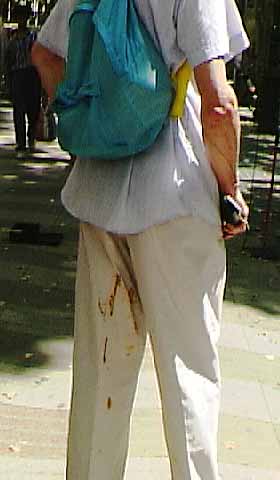
As I stepped up onto the curb I felt a slight wetness on the back of my knee below the hem of my skirt, as if I had splashed in a puddle. Not impossible, since it had rained recently. The rain had actually been the day before, but I just sort of knew it had rained, in the back of my mind, without really thinking about it.
Reflex made me glance into the street for the source puddle but in that same instant I knew there was no puddle. I asked Bob to look at my back but I knew what it was. I was horrified and exalted simultaneously. We were about to meet a charlatan, a gentleman thief with a fiction, an ersatz Samaritan and the most elusive of pickpockets.
Bob confirmed my disgusted suspicion: I had thick blobs of brown yuck on the back of my clothes, and so did Bob.
In that instant of offended confusion, while we admired each other’s backsides and laughed and grimaced, before we could organize our thoughts in that tenth of a minute, a man in shorts swept up to us, map in hand, sunglassed and baseball capped.
“Iy, look,” he pointed out. We swung around. “Bird, bird.”
Where did he come from? Out of the blue, it seemed. Still, we knew who he was. We knew what he was.
“Come, I help,” he offered with compassion and authority, ushering us into the pastry shop we’d been headed for. He already had a neat pack of Kleenex tissues in one hand, a small bottle of Evian in the other. He was more prepared than we had expected. Bob put his video in record.
Employees didn’t seem surprised in the pastry shop. They observed our intrusion with the vague interest of ranch hands regarding mating dogs. The man-in-shorts pressed a tissue into Bob’s hand and turned me around by the arm.
“You clean,” he said to Bob politely but insistently, indicating my back. He didn’t want to appear unseemly. You clean her and I’ll clean you—out. That was the idea. We’d heard the story many times from victims. While the husband cleans the wife, the man-in-shorts cleans the husband. Rather, he pretends to clean the husband. What he cleans is the pockets. And disappears before you know it.
Neither of us were good researchers this time: I didn’t cooperate fully, out of repulsion. And Bob was too busy filming to do his part. He was supposed to clean me off. But every time the impostor coached Bob in his role, Bob just said okay, fussed with his new camera, and failed to come to the aid of his wife. How could he videotape the scam if he were a participant? But how could the game continue without all the players?
Our man-in-shorts got frustrated and tried to slip away. We managed to waylay him though, outside the shop. We tried to get him to talk to us, to show us his squirt contraption, to tell us where he’s from. He was insistent about no video, no camera, but he didn’t rush off too obviously. He backed away slowly, trying not to look suspicious. Finally, he broke into a little trot and dashed into the handy metro stairway. Was its proximity coincidental? We think not.
Questions about the pigeon poop pickpocket ploy and M.O.
Barcelona police, it turned out, had been looking for the man-in-shorts for years. They knew his M.O., his territory, and that he was Peruvian. And they knew he always wore shorts. That was it. They now had his scam and his face on video.
We walked back toward La Rambla looking over our shoulders, hyper-observant. Bob and I disagree on the participation of the pastry shop people. I say they were in on it. I say the man-in-shorts buys his bread there and always leaves a hefty tip. I say they were awfully quick to bring out a roll of paper towels and laundry detergent when the man-in-shorts left. I say everyone’s a suspect. Bob says it’s impossible, they couldn’t be in on it. It just happened to be the corner where opportunity struck for the man-in-shorts. He couldn’t do his thing on only one corner in all the city.
J. S. Brody, an advertising executive in New York City, was a victim of the man-in-shorts. He remembers being astonished at the amount of bird droppings on his backside and his mother’s. “What do you have here, eagles?” he’d asked. The pigeon poop pickpocket ploy had taken place several blocks away from the pasticeria. For the clean-up operation, the pigeon-poop practitioner had drawn them into the lobby of an apartment house. So much for my theory on location.
Exactly ten years later—to the week!—Bob and I were strolling in the same neighborhood when we were squirted once again. We were astonished to see recognize the very same pigeon poop pickpocket. Read about our reunion with the pigeon poop pickpocket.
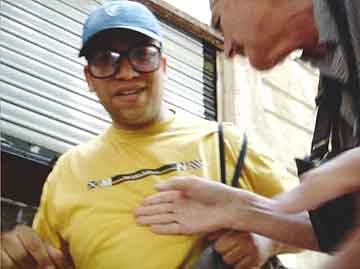
Adapted from Travel Advisory: How to Avoid Thefts, Cons, and Street Scams
Chapter Seven: Scams—By the Devious Strategist
Bangkok theft from tuk-tuk passengers
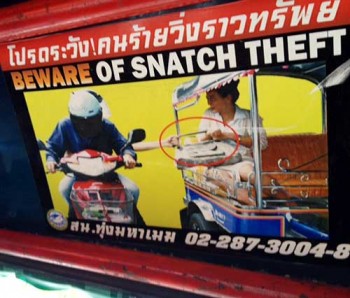
Bangkok theft has gotten bad enough that police have posted warnings about theft from tuk-tuk passengers. The convenient little auto-rickshaws, ubiquitous on the streets of Bangkok, are completely open and often stuck in traffic. Scooters can maneuver the interstices of clogged roads, sneak up on tuk-tuk passenger, then slither away between vehicles to beat an escape.
It’s a technique long in play in Italy, especially in Naples. There, targets of scippatori, the Italian version of scooter-riding bandits, are more often pedestrians. (Though the thieves have a nasty technique for stealing watches from expensive cars stuck in traffic, even with their windows closed.)
When riding in the three-wheeled open taxis, be sure to keep your bags secured, out-of-sight, or away from the perimeters.
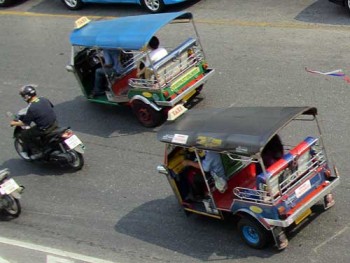
Bangkok theft extends beyond pickpocketing and bag snatching to scams that cost the tourist serious money. Particularly prevalent are gem scams, in which the visitor is brought to a “special sale” and encouraged to buy gems for resale at huge profits in their home countries. And bar scams, and vehicle-rental scams, drink-drugging, and pseudo-cops.
Then there’s the awful shoplifting-set-up scam at Bangkok’s airport, about which I’ve already written.
As if all these Bangkok theft issues weren’t enough for a tourist to worry about, there’s more. Road safety is one of the worst in the world, with poor vehicle and driver safety standards, little if any enforcement, few ambulances, and roads too clogged for ambulances to get through anyway. Add to that wild motorcycle riders attempting to speed around traffic by veering suddenly onto sidewalks, and even pedestrians must be seriously watchful.
I strongly recommend that travelers planning to visit Thailand read the U.S. State Department’s Country Specific Information on Thailand. Like all U.S. State Department country profiles, it covers very real ongoing crime and safety issues without exaggeration.

